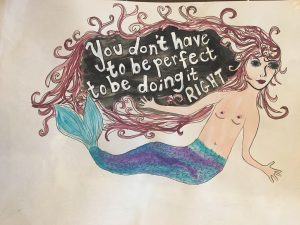It’s Monday morning, and I’ve been up since before the sun, struggling with my writer’s ego (aka, my ego). I committed a few months back to getting up before the sun and spending the first hour of my day revising my current manuscript. The theory is that I need to give myself permission in that first hour to focus on my own creativity since I will most certainly de-prioritize it once my “real” day begins.
 It’s a good theory. And for about a month and a half, it was a good practice. And then… and then I hit the muddled middle again, and my forward progress all but stopped. I got busy with everything else in my life and I wavered on my commitment to the writing. So I set it aside… and when I stop and ask myself just why I set it aside, when I’m completely honest with myself it’s because I’m afraid it’s not “good enough”. It’s because I doubt whether I’m able to make it into something that will be “good enough”.
It’s a good theory. And for about a month and a half, it was a good practice. And then… and then I hit the muddled middle again, and my forward progress all but stopped. I got busy with everything else in my life and I wavered on my commitment to the writing. So I set it aside… and when I stop and ask myself just why I set it aside, when I’m completely honest with myself it’s because I’m afraid it’s not “good enough”. It’s because I doubt whether I’m able to make it into something that will be “good enough”.
The difference between Ego and Good Enough
That is where I found myself this morning, when my only excuse for not putting more words on the page was the old collie who insisted on getting up when I did. (I absolutely can’t blame my writing woes on the collie. He’s a darling.) I realized the ego and fear in my current angst this morning, and sent out a tweet about it. And then magically, in my inbox, an email newsletter from K.M. Weiland appeared that spoke straight to the pain point I was experiencing.
We always intend to write something better than what actually shows up on the page. Always. With some stories, the gap between our vision and our current level of skill is more noticeable than with other stories. But the fact that we can dream up something so tremendous—even if we don’t yet know how to get it out of our minds and into reality—doesn’t signify failure.
https://www.helpingwritersbecomeauthors.com/creativity-vs-the-ego/
Releasing expectations to allow for creativity
It’d be amazing if, every time we wrote, everything we wrote made us millions of dollars, or millions of new fans. And the writer’s ego strives for that to be true, because that would justify all the time we spend slaving over our craft. That would make it worth it… right?
But no, as K.M. Weiland so graciously points out, more often than not, our expectation of our creative work doesn’t match the reality. Who can say what reasons there are for this? They’re different for everyone. The point is that not every story is going to bring you fame and fortune, or even pay for the amount of electricity that you use to write it. Sometimes you just have to create for the joy, for the curiosity of a thing, and release the expectation of it ever being “good enough” or “sale-worthy”. It’s the only way to learn, the only way to grow. Otherwise we’ll just find ourselves spinning over the same old story time and again, safe and comfortable.
I’d love to tell you that when I realized that about myself, that my fingers immediately found their way back to the keys and the story that I was working on was released. It wasn’t. Learning that the fear is there, that the expectation of “greatness” exists, doesn’t make it go away. But it does allow for some breathing room for my creative heart.
And that’s what I want to offer you this morning. Breathing room. The permission you need not to be an international bestseller right off the bat, and the knowledge that … even the stories that aren’t international bestsellers are worth telling. They’re important to someone. Your story matters.
A quick grounding exercise for the writer’s ego
If you, like me, are particularly feeling the pinch of the writer’s ego this morning, I want to offer you a quick grounding exercise to help refocus your priorities.
- First, sit up straight with both feet on the ground, or lie down flat, wherever you are, so that you can feel the earth supporting you.
- Now take 10 breaths. When you breathe in count to 10 slowly, and when you breath out count to 10 slowly, focusing on making the in and out last as long as possible, filling all the way up and releasing all the way out.
- Imagine yourself as a river, rushing rapidly or flowing swiftly and deeply. Creative energy and ideas move through you and out into the world. If you’re feeling cluttered and blocked by fear that you’re not good enough or that your story doesn’t matter, imagine yourself removing those blocks. Gently push them aside to make way for the words, or reach for the switch to release the dam.
- Now say to yourself one or both of these phrases “I don’t have to be perfect to be doing it right,” and “I will not allow my fear to hold me back.”
- Repeat as needed.
Your writer’s ego wants to be known and loved and approved of. Your creative heart, though… it just wants to be heard. So let’s go write.